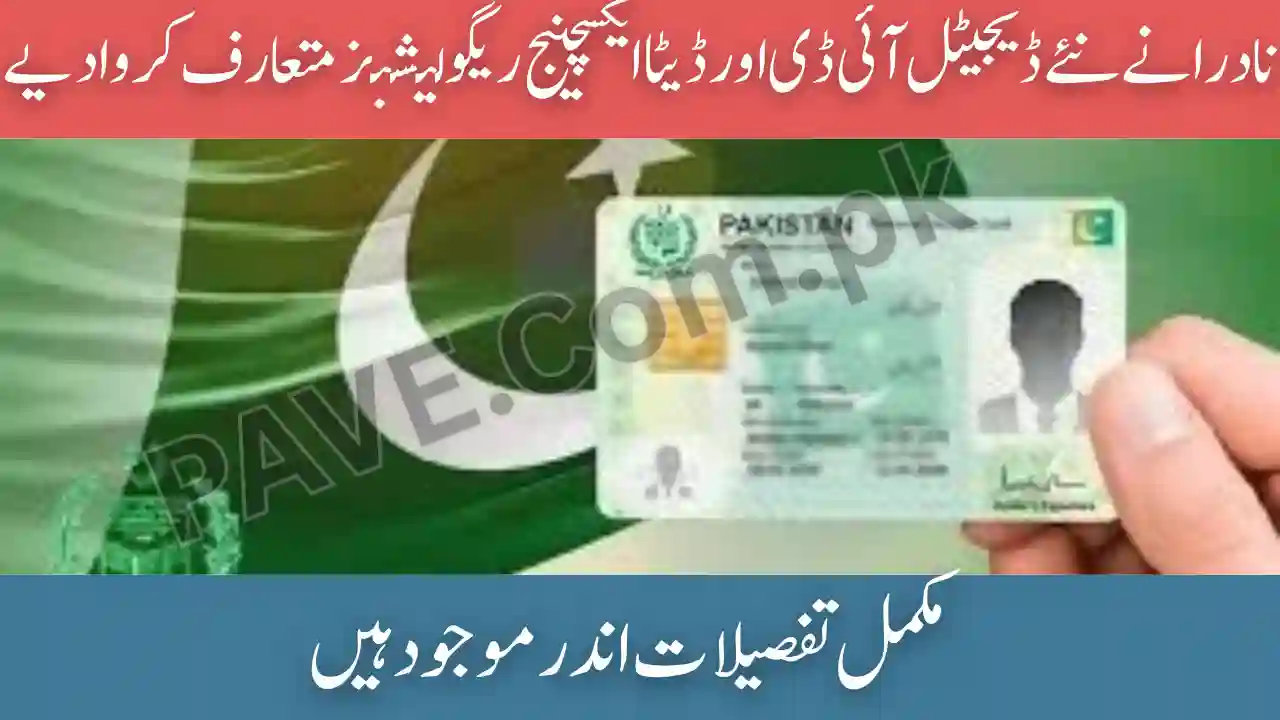NADRA Introduces New Digital ID and Data Exchange Regulations – Full Details Inside

NADRA Introduces New Digital ID and Data Exchange Regulations has taken a major step toward digital transformation by introducing new Digital ID and Data Exchange Regulations through NADRA (National Database and Registration Authority). These regulations aim to modernize how citizen identity and personal information are verified, shared, and protected across government and private sectors.
In today’s fast-moving world, secure digital identity is essential for accessing online services such as banking, SIM registration, health records, education portals, and government assistance programs like BISP, Ehsaas, or Sehat Sahulat. NADRA’s new policy makes this process faster and more secure while ensuring that personal data cannot be misused.
These regulations will allow government institutions, banks, fintech apps, telecom companies, and other authorized entities to verify a citizen’s identity instantly — with full legal protection and privacy safeguards. Citizens will no longer need to physically visit offices or submit photocopies of CNICs. Instead, identity verification will happen through secure digital channels.
In this article, we will explain how these regulations work, who can use them, how your data will be protected, and what benefits ordinary citizens will receive from this initiative.
What Are the New Digital ID and Data Exchange Regulations?
The Digital ID and Data Exchange Regulations introduced by NADRA define how personal identity information such as CNIC, fingerprints, mobile verification, and demographic details can be securely shared between NADRA and authorized organizations.
The aim is to build a standardized trust framework for digital identity verification across Pakistan. This framework sets rules for:
- How organizations can request data from NADRA
- How NADRA will approve or deny data access
- What level of identity verification (basic, advanced, biometric) will be provided
- How user consent must be taken
- How data privacy will be protected
This system will help eliminate fake identities, fraud, duplicate records, and illegal SIM or bank account registrations. It will also help businesses onboard customers quickly using digital KYC (Know Your Customer) methods.
Read More: CM Maryam Nawaz Inaugurates DG Khan Electric Bus 2025
Why Were These Regulations Introduced?
Previously, many organizations manually verified identity documents, which was slow, expensive, and insecure. People had to submit photocopies of CNICs, which could be misused. Fraudsters could forge documents or use someone else’s identity.
To solve these challenges, NADRA introduced digital data sharing laws so that identity verification could be:
✅ Instant
✅ Accurate
✅ Paperless
✅ Legally protected
✅ Consent-based
These new regulations also align Pakistan with international digital identity standards, making it easier for Pakistanis to access e-commerce, online banking, cross-border payments, and global services.
How Will It Work?
The data exchange system will operate in the following way:
| Step | Process | Details |
|---|---|---|
| 1 | Organization Requests Access | Banks, apps, or agencies request permission from NADRA. |
| 2 | NADRA Approves License | Only verified and trusted entities are granted access. |
| 3 | User Identity Verification | When a citizen uses a service, the platform requests CNIC or biometric verification. |
| 4 | NADRA Confirms Identity | NADRA shares a Yes/No response or verified data. |
| 5 | Consent-Based Sharing | In the future, citizens will receive notifications before data is shared. |
Which Sectors Will Benefit?
The new regulations will be used in several sectors:
| Sector | Use Case |
|---|---|
| Banks & Fintech | Digital account opening, loan processing |
| Telecom Companies | SIM registration and re-verification |
| Government Schemes | BISP, Ehsaas, Kisan Card, Health Card |
| Hospitals & Insurance | Patient identity verification |
| Education & Exams | Student record confirmation |
| E-Commerce & Delivery Apps | Secure customer authentication |
| Travel & Immigration | Faster clearance and border control |
How Will Citizens Benefit?
Here are the key benefits for ordinary Pakistanis:
- No Need for Photocopies or Physical Verification
- Faster Approvals for Banking, SIMs, or Loans
- Protection Against Identity Theft and Fraud
- Easy Access to Online Services
- Stronger Privacy with Consent-Based Sharing
- Better Tracking of Government Aid Distribution
- Increased Trust in Digital Transactions
Check Also: Punjab Rozgar Support Programme October 2025 – A Lifeline for Youth Employment
Data Privacy and Security Measures:
Many people are concerned about data misuse. NADRA has introduced strict rules to ensure maximum protection:
- Only licensed organizations can access data
- Every request must be logged and audited
- Unauthorized access will result in heavy penalties
- User consent will be mandatory for sensitive data
- End-to-end encryption will be used for all exchanges
Legal Penalties for Misuse:
To prevent violations, NADRA has defined the following legal punishments:
| Violation | Penalty |
|---|---|
| Sharing data without consent | Heavy fines up to millions |
| Unauthorized access | Suspension or cancellation of license |
| Data theft or leakage | Criminal action under cybercrime laws |
| Misuse of identity for fraud | Jail time under PECA Act |
Future Plans Under These Regulations 2025:
NADRA is planning several upgrades under this framework:
- Digital Wallets linked to CNIC
- Face Recognition-based logins for apps
- Digital Birth & Marriage Certificates
- Unified National Digital ID for All Services
Pakistan is moving toward a fully digital governance system, where every citizen will be able to access services from home without paperwork.
Check Also: ECP Announces Multiple New Vacancies 2025 – Apply Online Before Deadline
Conclusion:
The launch of NADRA’s Digital ID and Data Exchange Regulations is a historic milestone for Pakistan’s digital future. With this system in place, identity verification will become faster, safer, and more reliable than ever before. Citizens will no longer need to carry physical documents everywhere or worry about misuse of their CNIC.
By enabling secure data sharing across government and private sectors, this initiative will boost digital banking, e-commerce, telecom, healthcare, and welfare programs.
Pakistan is finally building a modern identity infrastructure that puts citizen privacy and convenience first.
FAQs NADRA Introduces New Digital ID and Data Exchange Regulations 2025:
1. Will my data be shared without my permission?
No. NADRA has made it mandatory for organizations to obtain consent before accessing any personal information.
2. Can private companies access my CNIC information?
Only licensed and approved companies such as banks or telecom operators can request access under strict regulations.
3. Will I still need to show physical CNIC?
In most cases, digital verification will replace physical photocopies and in-person visits.
4. Is this system safe from hackers?
Yes. NADRA is using encrypted data exchange with legal penalties for unauthorized access or misuse.
5. When will citizens start using this system?
Implementation has already begun in banking and telecom sectors, and more services will adopt it gradually.










